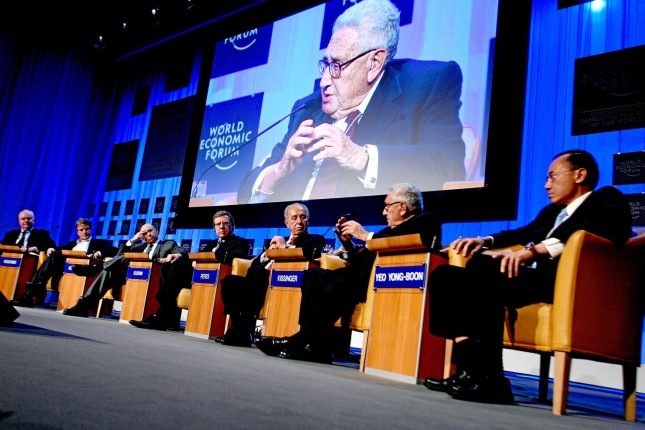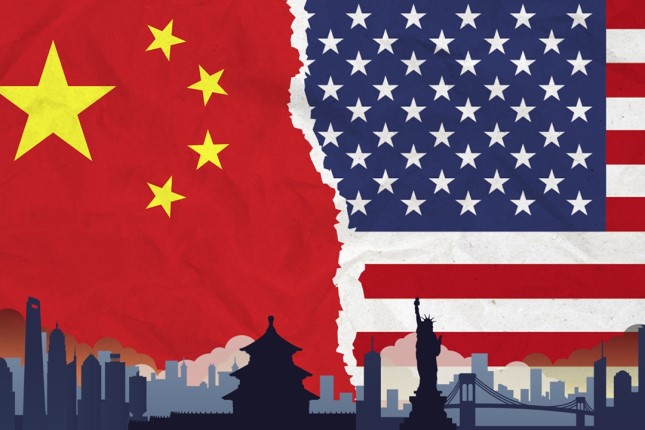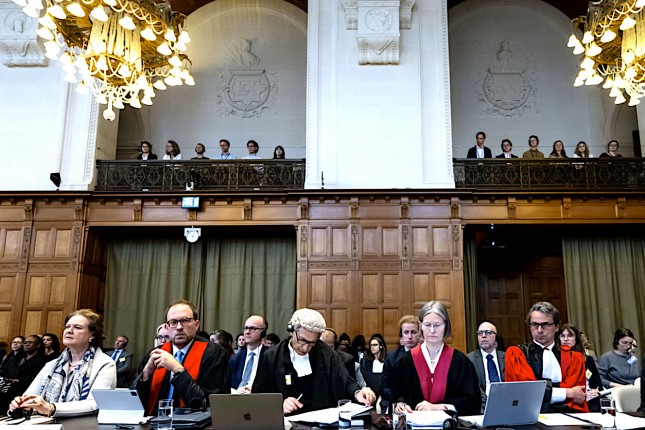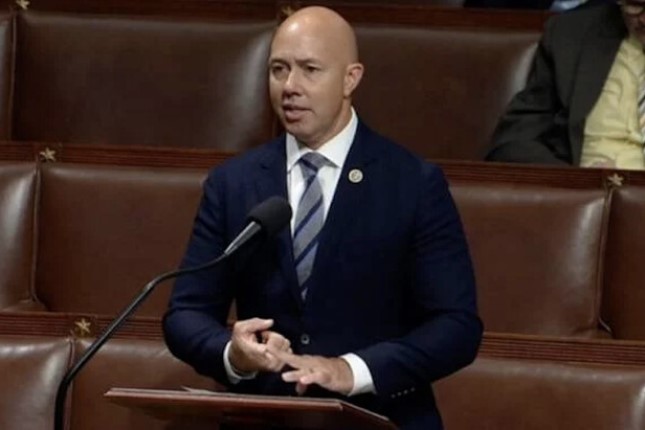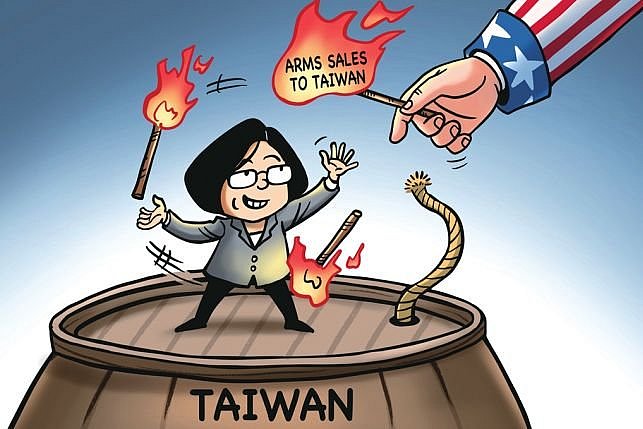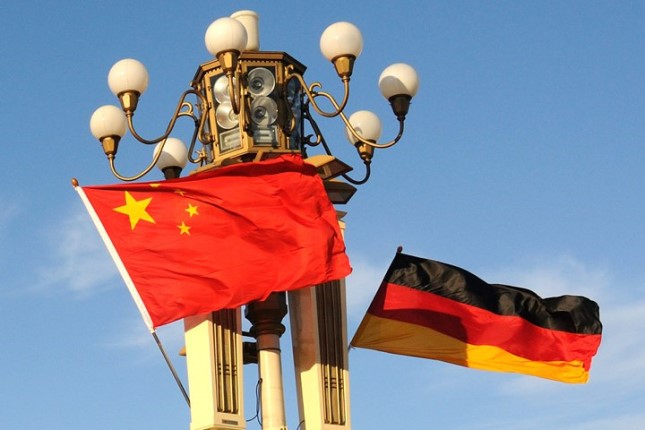Henry Kissinger looms large in the thinking of people in the Arab world.
The former U.S. secretary of state’s name is often invoked in political discussions and many still think that he currently, or permanently, wields political influence, decades after he left office.
His name is associated with sinister diabolic plots. The media of Gulf regimes have produced classic anti-Semitic scenarios about his role in world affairs.
In a way, Kissinger has been unfairly treated by the Arab world. Too much influence has been ascribed to him; his role in U.S. wars and aggression has been highly exaggerated.
The U.S. is a vast government empire where Democrats and Republicans act in unison when it comes to foreign policy and foreign wars. The revolt by the D.C. establishment and media against Donald Trump is largely due to his tendency to try to deviate from the established norms of the empire in foreign policy. He dared to call for retrenchment and focus on domestic policies.
To say that Kissinger’s role has been largely overstated in the Arab world is not to exonerate him of war (and peace) crimes.
He is responsible during his tenure of a variety of crimes, ranging from the secret bombing of Cambodia; East Timor, Chile’s coup against democracy, and the murder of people on a mass scale in faraway countries; either to advance U.S. stance in negotiations or to combat the spread of communism.
Bipartisan US Foreign Policy
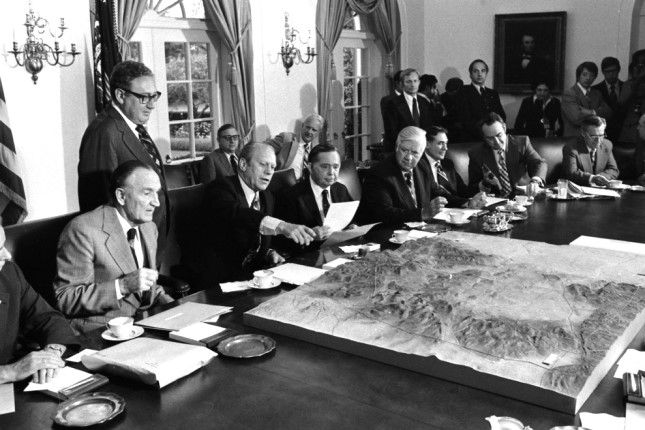
President Gerald R. Ford and Secretary of State Henry Kissinger review a map of the Sinai Peninsula during a meeting with bipartisan congressional leaders in 1974. Photo: U.S. National Archives.
But Kissinger was not acting alone. Any understanding of the U.S. government (especially in foreign policy where the number of interest groups involved in making policy is very limited in comparison to domestic policy) should take into consideration the collective leadership by both parties in decisions of foreign policy.
U.S. wars in Iraq and Afghanistan were bipartisan wars. U.S. wars around the globe during the Cold War gained bipartisan support, and the liberal forces, like the labor movement, was not less anticommunist than former U.S. President Richard Nixon.
In the Middle East, Kissinger had a big impact by virtue of his presence during the critical years of the 1970s and the October War.
In the Middle East — especially in repugnant Gulf media — too much about the harm he inflicted on the region is attributed to his Jewishness when, in fact, he was extremely insensitive to anti-Seimitism, even in his presence.
This is a man who sat with Nixon when the latter expressed vile racist and anti-Jewish sentiments. He ingratiated himself with King Faisal of Saudi Arabia, when the latter was one of the most notorious anti-Semites of the 20th century. Faisal never hid his belief that communism and Judaism are among the evils of the world.
But Kissinger did care deeply about Israel and he strove to serve its interests, but not more than former Presidents Ronald Reagan, Bill Clinton or Barack Obama. He viewed Israel from the standpoint of anti-communism and anti-Arab nationalism.
Kissinger’s shuttle diplomacy achieved a great deal for Israel because it was the beginning of America’s attempt at fractionalization of the Arab-Israeli conflict.
Prior to the 1970s, Gamal Abdul-Nasser of Egypt insisted that any diplomatic effort and negotiations over the Arab-Israeli conflict should be predicated on a comprehensive and just solution, which implied that the Palestinian problem is the crux of the conflict.
Negating Nasser’s Unity Principle
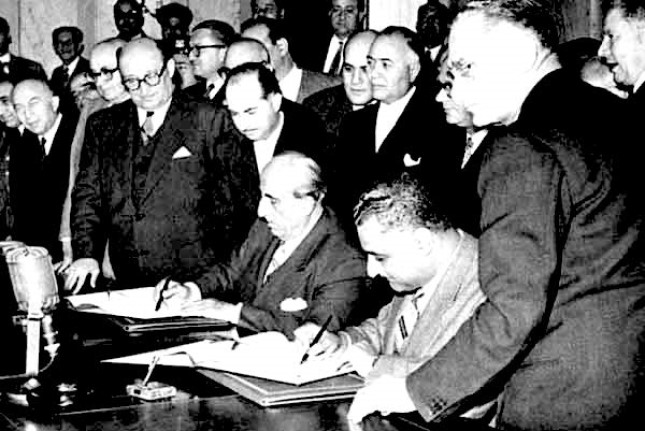
Egypt’s President Gamal Abdul-Nasser, seated right, signing unity pact with Syrian President Shukri al-Quwatli, forming the United Arab Republic, Feb. 1, 1958. Photo: Public domain / Wikimedia Commons.
Kissinger in 1973 managed to negate Nasser’s principle and both Syria and Egypt went along with Kissinger’s approach; he negotiated with Syria and Egypt and Jordan separately, something that Nasser would not have countenanced.
The 1975 Sinai II agreement had a far-reaching impact on the region and it freed Israel’s hand. Every Israeli act of aggression or invasion after 1975 is indebted to Kissinger for removing a collective Arab defense posture vis-à-vis Israel.
Three factors contributed to the reputation of Kissinger in the Arab world:
No. 1. The Saudi regime’s vast propaganda outlets used Kissinger to spread the notion of an anti-Semitic (allegedly diabolic) plot by world Jewry against Islam and Muslims. King Faisal seemed to have cordial relationship with Kissinger and complied with his request for the suspension of the Arab oil boycott in the wake of the October war in 1973. But he let his media propagate his real views of Kissinger and of Jews.
No. 2. Anwar Sadat was in total awe of Kissinger and would mention him glowingly in his long speeches. He referred to him as “dear Henry” and would marvel at his intelligence and skills.
Sadat, as he was steering Egyptian foreign policy away from Nasser’s Arab nationalist path, needed a justification of his shifts and Kissinger was the all-knowing American who was willing and eager to solve all of Egypt’s problems.
Kissinger handled Sadat patronizingly but this formerly powerless yes-man of Nasser was easily impressed with the attention that Kissinger gave him. Sadat would try to persuade Egyptians that Kissinger had a rational even-handed approach to the Arab-Israeli conflict that would show no bias toward any side in the conflict (although Sadat would mention his Jewishness).
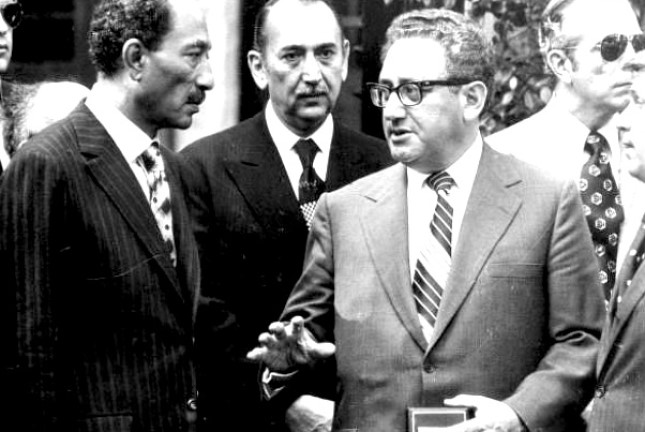
Egyptian President Anwar Sadat, left, and U.S. National Security Advisor and Secretary of State Henry Kissinger. Photo: From the C.I.A. booklet “President Nixon and the Role of Intelligence in the 1973 Arab-Israeli War,” Public domain.
No 3. President Sulayman Franjiyyah of Lebanon (1970-1976) and Lebanese Maronite politician Raymond Idde would mention the name Kissinger in every speech or press interview when talking about the Lebanese civil war. For them, Kissinger was the devious schemer behind the plan that brought about the Lebanese civil war in 1975. For them it sounded as if Kissinger was a lone operator acting in defiance of the American national interest.
Ban on US Contact with PLO
On the Palestinian front, Kissinger was instrumental (along with other members of the administration) in banning any contact or meetings between U.S. officials and PLO members or leaders.
The PLO had to submit to U.S. conditions (which included denouncing and renouncing terrorism — according to the Israeli definition of the term) before the U.S. government could launch official meetings with the PLO. (Only the C.I.A. was exempt from this ban, and the C.I.A. and the PLO coordinated famously in the 1976 evacuation of American citizens from Lebanon).
The ban on contact with the PLO was among the pledges that the U.S. government made to Israel as part of the secret appendix of the Sinai II agreement.
But this was not the only service that Kissinger rendered to Israel. He famously asked Israel to delay accepting the cease-fire in the October 1973 war in order that it could gain more territories and enhance its post-war negotiating posture.
Kissinger’s boss, Nixon, was such a staunch supporter of Israel that he once informed Israeli Prime Minister Golda Meir that the best way to handle Arabs was with a machine gun. (He stood up from his chair and acted out the firing of a machine gun, according to William Quandt’s account in the Peace Process).
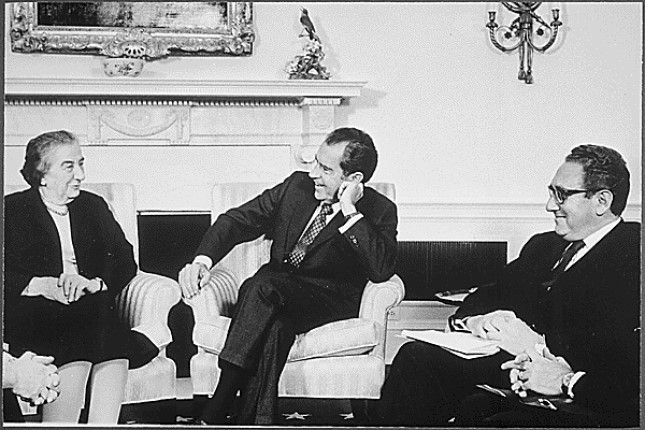
From left: Israeli Prime Minister Golda Meir, U.S. President Richard Nixon and Kissinger, March 1, 1973 in the Oval Office. Photo: Oliver Atkins / Nixon’s photographer via Wikimedia Commons.
So much of U.S. foreign policy in the Middle East, especially through the moribund “peace process,” was shaped by Kissinger’s formula for the elimination of Palestinian representatives from international negotiations. Unfortunately, Yasser Arafat later succumbed to Kissinger’s conditions and with that he signed the death sentence of the PLO.
In Lebanon, Franjiyyah and Iddie, and many in the local press, stuck to the theory that Kissinger plotted the dissolution of Lebanon and that the civil war was his personal design. To be sure, the U.S. government, since the Johnson administration, was instrumental in arming and aiding the right-wing militias of Lebanon, which were already receiving arms and aid from Israel.
The newly released archival documents about U.S. foreign policy in Lebanon clearly show American culpability in the eruption of the war in an attempt to smash not only the PLO but also the Lebanese and international left in Lebanon.
But U.S. plans were beyond the person of Kissinger, and the exaggeration of the role of Kissinger not only may carry anti-Semitic undertones but it would also exonerate the U.S. empire and blame its crimes and follies on one man.
The U.S. just celebrated the 100th birthday of Kissinger; liberals and conservatives paid tribute. We in the Arab world could only wonder how the great Palestinian writer, Ghassan Kanafani, was murdered at 36 by Israeli terrorists in Beirut as he was a man who never carried a gun, while Kissinger lived until his 100th birthday. That is enough to take you from belief to unbelief.
Main photo: Henry Kissinger, seated second from right and projected on overhead screen, with Israeli President Shimon Peres to his right during a session of the World Economic Forum in in Davos, 2008 © Annette Boutellier / World Economic Forum / CC BY-SA 2.0.
Source: Consortium News.
